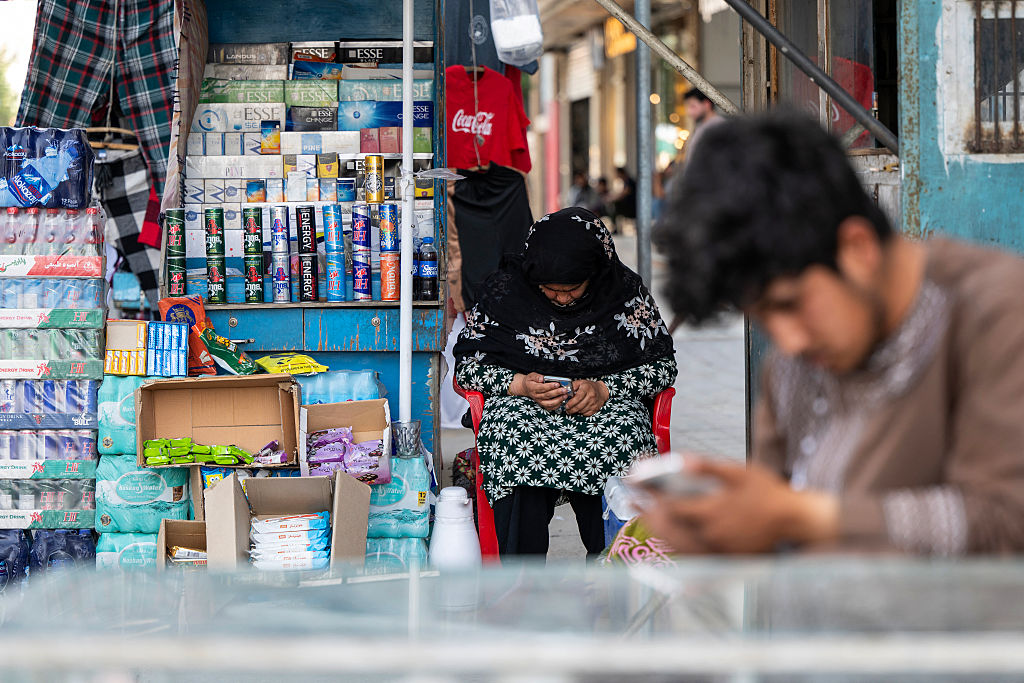On Monday evening, internet and telephone communications were cut off across Afghanistan. The entire country was left in darkness, with millions of women and girls living under the Taliban losing their last connection to the outside world.
Like countless Afghans in the diaspora, I spent hours trying to contact my colleagues and relatives back home. That night, I sent a message to a Signal group of more than two dozen aspiring women journalists from across Afghanistan who had participated in our eight-month online journalism training at Zan Times. I asked if anyone was online. No reply.
[time-brightcove not-tgx=”true”]
One of these women in Herat had been investigating the case of a 14-year-old girl who was at risk of child and forced marriage. While shopping with her parents, a Taliban soldier had taken her father’s phone number. Since then, he made his intentions clear: he wanted to marry the child. When the father refused, he was attacked with a knife. The reporter had already sent me pictures and audio recordings, promising a complete draft by Monday night. After the blackout began, I heard nothing for 48 hours.
On Wednesday, her voice message finally came through. “My mental health was very bad,” she said. “My situation was so bad that I couldn’t breathe. I don’t know what would have happened to me if I hadn’t been connected to the internet today.”
Internet services were restored across Afghanistan by Wednesday afternoon but we still have little idea what really happened or why. The Taliban have yet to comment on the cause of the blackout. But a spokesperson for the Taliban governor of Balkh province posted on Sept. 15 that internet access was being blocked “for the prevention of vices” and other local regions have followed suit in recent days. The blackout also fits a consistent pattern the Taliban have shown: the systematic removal of Afghan women from public life.
Read More: What U.S. Aid Cuts Mean for the Women of Afghanistan
On Afghan social media, many celebrated the return of internet and phone services. But people also described the despair of not being able to reach family or colleagues. I spent part of Tuesday searching in Edmonton, Alberta for a prepaid long-distance phone card, hoping for a backup way to reach people in case telephone services were restored. At one of the stores I visited, a young cashier gave me a blank stare; he had never heard of such a card. I realized I hadn’t bought one since 2019, when I was interviewing sources from districts in central Afghanistan with no internet. Since then, there was no need. Almost everyone I knew had some sort of internet access.
Afghanistan, like everywhere else today, depends on connectivity for banks, hospitals, airports, government services, and private enterprise. But my first concern after the blackout was what it means for millions of Afghan women and girls.
The Taliban seized power in August 2021, and a crackdown on women quickly followed. Girls were notably banned from secondary school the next month, meaning that online education became one of the last avenues of hope. Volunteers both inside and outside of Afghanistan have since created digital schools and universities where girls could keep studying. Women have also found ways to support themselves: teaching online, freelancing, launching small businesses through social media. They also created online book clubs and poetry nights to keep their spirits alive. In short, they built an online marketplace for themselves out of sheer determination to survive.
Read More: After the Fall of Kabul, Afghan Women Are Attempting to Build New Lives Abroad
This week, all of that collapsed. Online schools went dark. Businesses disappeared. Women who had built these fragile networks of support and opportunity felt themselves plunged back into enforced isolation. In a country already facing a mental health crisis, this blackout was devastating. “I felt like I was stuck in an invisible cell, I couldn’t reach anyone. I only stared at walls and didn’t talk,” the woman journalist in Herat told me in a Signal voice message after internet was restored. “I was afraid what would happen if this [blackout] continued.”
For now, the internet remains the only tool that allows Afghan women to learn, to work, to speak freely, and to be heard. But the Taliban is intent on stopping that.
The question is whether the world will choose to listen, and see the blackout as a wake-up call.

